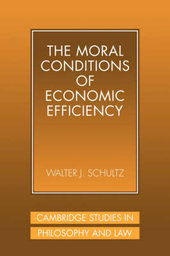
|
The Moral Conditions of Economic Efficiency
Paperback / softback
Main Details
| Title |
The Moral Conditions of Economic Efficiency
|
| Authors and Contributors |
By (author) Walter J. Schultz
|
| Series | Cambridge Studies in Philosophy and Law |
|---|
| Physical Properties |
| Format:Paperback / softback | | Pages:160 | | Dimensions(mm): Height 228,Width 153 |
|
| Category/Genre | Ethics and moral philosophy |
|---|
| ISBN/Barcode |
9780521048279
|
| Classifications | Dewey:174 |
|---|
| Audience | | Professional & Vocational | |
|---|
| Illustrations |
Worked examples or Exercises
|
|
Publishing Details |
| Publisher |
Cambridge University Press
|
| Imprint |
Cambridge University Press
|
| Publication Date |
3 January 2008 |
| Publication Country |
United Kingdom
|
Description
In the late eighteenth century, Adam Smith significantly shaped the modern world by claiming that when people individually pursue their own interests, they are together led towards achieving the common good. But can a population of selfish people achieve the economic common good in the absence of moral constraints on their behavior? If not, then what are the moral conditions of market interaction which lead to economically efficient outcomes of trade? Answers to these questions profoundly affect basic concepts and principles of economic theory, legal theory, moral philosophy, political theory, and even judicial decisions at the appellate level. Walter Schultz illustrates the deficiencies of theories which purport to show that markets alone can provide the basis for efficiency. He demonstrates that efficient outcomes of market interaction cannot be achieved without moral normative constraints and then goes on to specify a set of normative conditions which make these positive outcomes possible.
|